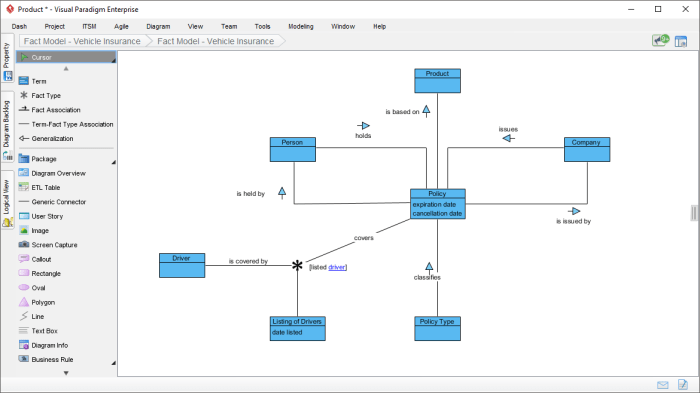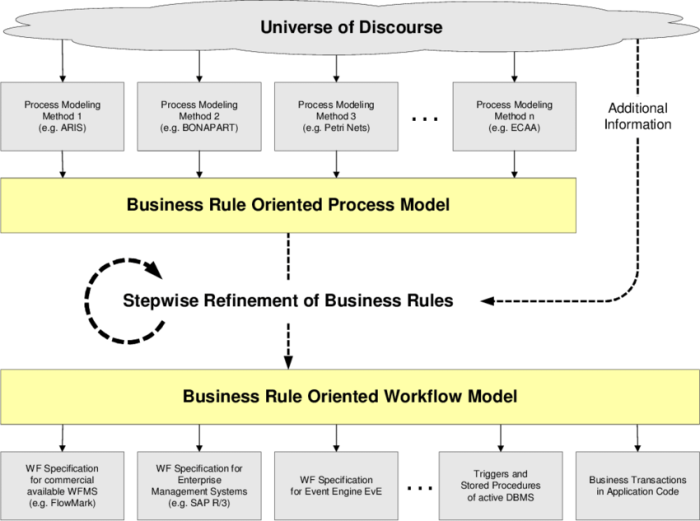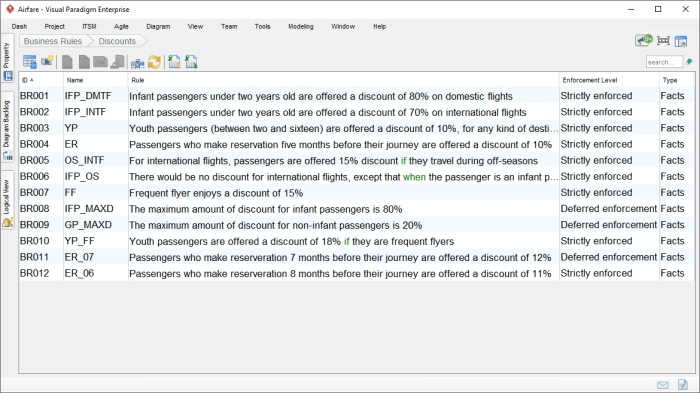In today’s fast-paced business environment, organizations are constantly seeking ways to streamline operations, enhance decision-making, and drive growth. Business rules software has emerged as a powerful tool that empowers businesses to achieve these objectives by automating and enforcing business policies and logic.
This comprehensive guide will delve into the world of business rules software, exploring its definition, key features, implementation strategies, integration capabilities, and real-world use cases. By understanding the benefits and potential of business rules software, organizations can make informed decisions about its adoption and harness its power to transform their operations.
Business Rules Software Definition
Business rules software is a type of software that helps businesses to manage and enforce their business rules. Business rules are the policies and procedures that govern how a business operates. They can be used to define everything from the way that customers are processed to the way that products are manufactured.
Business rules software can be used to improve the efficiency and accuracy of business processes. It can also help businesses to reduce costs and improve compliance with regulations.
Examples of Business Rules Software Applications
- Customer relationship management (CRM) systems
- Enterprise resource planning (ERP) systems
- Supply chain management (SCM) systems
- Financial management systems
- Human resources management systems
Benefits of Using Business Rules Software
- Improved efficiency
- Increased accuracy
- Reduced costs
- Improved compliance
Key Features of Business Rules Software

Business rules software is a powerful tool that can help organizations to automate their business processes, improve decision-making, and reduce risk. The key features of business rules software include:
• Centralized management of business rules: Business rules software provides a central repository for all of an organization’s business rules. This makes it easy to manage and update rules, and ensures that all users are working with the same set of rules.
• Automated enforcement of business rules: Business rules software can automatically enforce business rules, ensuring that all transactions and decisions are compliant with the organization’s policies.
• Real-time decision-making: Business rules software can provide real-time decision-making, enabling organizations to make better decisions faster.
• Improved compliance: Business rules software can help organizations to improve compliance with regulatory requirements by providing a clear and auditable record of all business decisions.
• Reduced risk: Business rules software can help organizations to reduce risk by automating processes and ensuring that all decisions are made in accordance with the organization’s policies.
Feature Comparison of Business Rules Software
There are a number of different business rules software solutions available on the market. Each solution has its own unique set of features, so it is important to compare the different solutions before making a decision.
The following table compares some of the most popular business rules software solutions based on their features:
| Feature | Vendor A | Vendor B | Vendor C |
|---|---|---|---|
| Centralized management of business rules | Yes | Yes | Yes |
| Automated enforcement of business rules | Yes | Yes | Yes |
| Real-time decision-making | Yes | Yes | No |
| Improved compliance | Yes | Yes | Yes |
| Reduced risk | Yes | Yes | Yes |
As you can see, the different business rules software solutions offer a variety of features. It is important to consider your specific needs when selecting a solution. For example, if you need real-time decision-making, then you will need to select a solution that offers this feature.
Importance of Considering Specific Features
When selecting business rules software, it is important to consider your specific needs. Some of the factors that you should consider include:
- The size and complexity of your organization
- The number of business rules that you need to manage
- The level of automation that you need
- The level of compliance that you need
- The budget that you have available
By considering these factors, you can select a business rules software solution that meets your specific needs and helps you to achieve your business goals.
Business Rules Software Implementation

Implementing business rules software is a complex process that requires careful planning, development, testing, and deployment. By following best practices and involving key stakeholders throughout the process, businesses can ensure a successful implementation that meets their specific needs.
Planning
The planning phase is crucial for ensuring the success of a business rules software implementation. During this phase, businesses should define their goals and objectives, identify the business rules that need to be automated, and develop a project plan that Artikels the steps involved in the implementation process.
Development
The development phase involves creating the business rules software application. This includes designing the user interface, developing the business rules engine, and integrating the software with other systems. It is important to involve key stakeholders in the development process to ensure that the software meets their needs.
Testing
Thorough testing is essential to ensure that the business rules software is working correctly. This involves testing the software’s functionality, performance, and security. Testing should be conducted by both the development team and independent testers.
Deployment
The deployment phase involves installing the business rules software on the production environment and making it available to users. It is important to have a rollback plan in place in case of any unforeseen issues during deployment.
Best Practices
There are several best practices that businesses can follow to ensure a successful business rules software implementation:
- Involve key stakeholders throughout the process
- Define clear goals and objectives
- Develop a detailed project plan
- Use a proven development methodology
- Test the software thoroughly
- Have a rollback plan in place
Business Rules Software Integration

Business rules software can be integrated with other systems to create a more comprehensive and efficient business solution. This can be done through a variety of methods, including:
- Direct integration: This involves connecting the business rules software directly to other systems, such as an ERP system or a customer relationship management (CRM) system.
- Middleware: This involves using a middleware application to connect the business rules software to other systems. Middleware can help to translate data between different systems and to manage the flow of data between them.
- API integration: This involves using an application programming interface (API) to connect the business rules software to other systems. An API is a set of protocols and routines that allow different applications to communicate with each other.
Integrating business rules software with other systems can provide a number of benefits, including:
- Improved efficiency: By integrating business rules software with other systems, businesses can automate many of their business processes. This can lead to significant time and cost savings.
- Increased accuracy: By automating business processes, businesses can reduce the risk of errors. This can lead to improved customer satisfaction and increased profitability.
- Greater flexibility: By integrating business rules software with other systems, businesses can make it easier to change their business processes. This can help them to adapt to changing market conditions and to stay ahead of the competition.
There are many examples of successful business rules software integrations. One example is the integration of business rules software with an ERP system. This integration can help businesses to automate their financial processes, their inventory management processes, and their customer relationship management processes.
Another example is the integration of business rules software with a CRM system. This integration can help businesses to track their customer interactions, to manage their sales pipelines, and to provide better customer service.
Business Rules Software Use Cases
Business rules software finds application across a wide range of industries, aiding organizations in addressing complex business challenges and enhancing operational efficiency.
From streamlining processes to ensuring compliance, business rules software has proven its versatility in delivering tangible benefits.
Banking and Finance
- Automating loan approvals and risk assessments, reducing processing time and improving accuracy.
- Enforcing regulatory compliance, ensuring adherence to industry standards and minimizing legal risks.
- Personalizing customer experiences by tailoring products and services based on specific rules.
Healthcare
- Supporting clinical decision-making by providing real-time access to patient data and evidence-based guidelines.
- Automating insurance claim processing, reducing errors and improving efficiency.
- Enhancing patient safety by enforcing protocols and reducing medication errors.
Retail and E-commerce
- Automating pricing and discounting rules, optimizing revenue and customer satisfaction.
- Personalizing product recommendations based on customer preferences and purchase history.
- Managing inventory levels and optimizing supply chain operations, reducing costs and improving customer service.
Insurance
- Automating underwriting processes, streamlining policy issuance and reducing turnaround time.
- Enforcing risk management rules, ensuring accurate pricing and mitigating financial losses.
- Improving customer service by providing real-time access to policy information and claim status.
Business Rules Software Trends
The business rules software market is constantly evolving, with new trends emerging all the time. These trends are shaping the future of business rules software and have the potential to significantly impact organizations.
Artificial Intelligence and Machine Learning
One of the most significant trends in business rules software is the increasing use of artificial intelligence (AI) and machine learning (ML). AI and ML can be used to automate many of the tasks that are traditionally performed by business analysts, such as identifying and extracting business rules from existing systems.
This can free up business analysts to focus on more strategic initiatives.
Cloud-Based Business Rules Software
Another major trend is the move towards cloud-based business rules software. Cloud-based software offers a number of advantages over on-premises software, including lower costs, greater flexibility, and easier scalability. As a result, more and more organizations are choosing to deploy their business rules software in the cloud.
Low-Code/No-Code Business Rules Software
Low-code/no-code business rules software is becoming increasingly popular. This type of software allows users to create and manage business rules without having to write code. This makes it easier for non-technical users to participate in the business rules development process.
The Implications of Business Rules Software Trends for Organizations
The trends in business rules software are having a significant impact on organizations. These trends are making it easier for organizations to develop and manage business rules, which can lead to improved efficiency, agility, and compliance.Organizations that are able to take advantage of these trends will be well-positioned to succeed in the future.
Last Word
Business rules software has become an indispensable asset for organizations looking to optimize their operations and stay competitive in the digital age. By automating business logic, improving decision-making, and fostering collaboration, this technology empowers businesses to adapt to changing market dynamics, enhance customer experiences, and drive innovation.
As technology continues to evolve, we can expect even more advanced and sophisticated business rules software solutions that will further revolutionize the way organizations operate.

